- Home
- Captain W E Johns
03 Now To The Stars Page 8
03 Now To The Stars Read online
Page 8
'Let us hope,' said Vargo soberly, 'that when we emerge from this darkness Borron will be able to pick up his bearings, for it is by the stars and the planetoids around that he steers the ship. If they remain hidden, or if they should have moved, it would not be easy to find our way home. Our water and provisions will only last a certain time.'
'If we ran out we could always land somewhere and find some,' suggested Rex hopefully.
'The old mariners had to do that when they lost their way.'
'Having seen something of the worlds around us let us pray that will not be necessary,'
said Toby drily.
But as things turned out, that is just what they were forced to do.
How long the ship remained in total darkness Rex did not know; but it was a long time, and before the end of it he felt he was in some danger of losing his reason. That was the real peril. Nothing could be done. The wisdom of Borron's decision to go with the cloud of dust was not to be disputed, although as the hours passed there were moments when he himself would have taken the risk of collision rather than endure the torture of uncertainty in the dreadful darkness. The only relief lay in conversation. They could not see each other, but it was something to be able to hear, and know the others were there.
Borron told stories of the strange worlds he had visited. The others, in turn, talked of conditions on Earth. And so time passed. How far they had been carried off their course was not known, but it was thought to be a great distance, for the cloud, Vargo declared, without meeting any resistance, must be travelling at astronomical velocity.
The ordeal ended when Rex was asleep. He awoke to hear Tiger saying: 'Is it that my eyes are adapting themselves to the darkness or are the windows becoming grey - or at any rate, not so black as they were?'
There was a brief silence in which everyone must have been looking. Then Vargo said: '
They are grey. The dust is dispersing. Soon it should be light enough for us to see.'
And so it was. Little by little grey light crept in through the windows until, at long last, Rex could once more see his companions, although at first only vaguely. He nearly collapsed with relief, for the strain had been fearful. He felt he could bear anything as long as he could see.
Borron now improved matters by taking his ship slowly in the direction from which the light seemed to be coming. This had the desired effect, but they still moved through a world of gloom. Again Borron displayed his spacemanship, although Rex watched certain preparations among the crew without guessing what they were going to do. Two put on their suits, and taking a coil of line went into the airlock chamber. The inner door was closed, and a minute later the purpose of the operation was revealed when a ray of light pierced the ship and Rex saw a face looking in from outside. After his first start of alarm he realized that the men were cleaning the windows, the outer side of which had evidently picked up a coating of dirt.
There was, of course, no risk of them falling. The rope was to enable them to move about.
This cleaning operation made a big difference and by the time the men had finished they could all see each other clearly. Conditions outside were not as bad as they had appeared from inside. That is not to say things were normal. Far from it. But with visibility improved it meant that Borron could increase the ship's velocity, all the time, of course, keeping a careful lookout. The light continued to improve, and after about an hour in Earthly time one or two of the brighter stars were peering mistily at them. This allowed Borron to make his first observations. But so long did he remain without speaking that the Professor asked him if he knew where he was.
`No,' answered Borron frankly.
That's what I thought,' murmured the Professor.
'Such constellations as he can see are not in their usual places,'
explained Vargo. 'But presently we may pick up a landmark.'
In the event they did not, and after a while Borron had to admit that he was completely lost. However, that did not mean they would never find their way back to Mino, although that might be difficult and take time.
It was not so much the shortage of food and water that worried him as the exhaustion of the air supply. Should that happen it would, of course, mean the end.
Rex did not think about this. He could see, and that was enough to go on with. From the window he could see stars, with smaller ones appearing; but this was only in one direction. From the other side of the ship the sky was still unbroken black, the stars being hidden by the great cloudbank now moving away from them.
Borron now opened up to full velocity, with the object, as he said, of making a wide circuit in the hope of picking up a planetoid, or better still, a group of them, that he could recognize. Identification of any one would give him his position.
After some time had elapsed they saw reflected sunlight catching one side of a very small planetoid and made their way towards it. It could not have been more than ten miles in diameter. As for the sun itself, which had at first revealed its position beyond the murk as a great brown globe, it now slowly turned to blue, sometimes dark and sometimes pale according to the composition and density of the intervening matter, which Borron affirmed might have been plain dust or frozen gas of some sort.
Going close to the planetoid they made it out to be an arid wilderness with no sign of life.
Borron consulted the crew but none was able to identify it. There was no distinguishing feature and the globe was typical of many smaller ones.
They went on to another, somewhat larger, with similar result. It was mostly desert with outcrops of rock. The only vegetation was a dwarf form of cactus which Borron said was common on many of the planetoids. They did not land, but pursued their quest for something that could be recognized.
As the lonely little world dropped away behind them the Professor remarked: 'It may well be that some of these balls of dirt contain minerals which will be of great value to civilized planets when their own resources have been used up. One day they will be exploited, and probably become theatres of war for the nations laying claim to them.'
'What are the chances of finding a new element, an unknown metal, for instance?' asked Toby.
'Very remote, I would say,' replied the Professor.
'We found a new metal on Mars - orichalcum,' reminded Rex.
'That was not a new metal; it was a very old one that had been lost,'
contended the Professor. 'Certainly none is known on Earth today, but that is not to say there is none there. It was known in ancient Atlantis.
There may be more somewhere, deep in the ground. An entirely new mineral would be a wonderful discovery.'
Borron was now making for a much larger planetoid on which the sun was shining.
Actually it was in partial eclipse. Its diameter might have been a hundred miles. Rex hoped that there would be some inducement to land, for he was tired of sitting still and would have welcomed a chance to stretch his legs. So he watched the globe becoming larger as they approached with more than usual interest. It had at least one conspicuous feature; a large lake; just one. It looked like water, but Borron warned them that this was not necessarily the case. On some worlds there were lakes of oil, of bitumen, and similar substances. The disappointing thing about this particular lake was that Borron could not recall seeing it before.
An elderly member of the crew, who had served in the Remote Survey Fleet, said it struck a chord in his memory but he would not swear to it. In any case, he did not know the position of the globe in relation to the regular space routes.
There was some vegetation, including small, stiff-looking trees, so Borron said he would land and test the place for an atmosphere. Whether there was one or not it would do them good to have a little exercise, even if they had to wear spacesuits.
He chose one of the wide sandy areas that fringed the lake, and presently the Tavona's legs scraped softly on the surface. Everyone sat still while Vargo made the usual test for atmospheric conditions. This was soon done, with result
s which while disappointing, were not unexpected. There was no air to speak of. A little hydrogen and carbon dioxide, that was all.
Suits would have to be worn if they went out.
Rex was hoping they might find some fruit or vegetables, and made a remark to that effect. But Vargo warned him sternly to eat nothing until it had been examined, for while fruits and berries were sometimes found in these out-of-the-way places as often as not they were poisonous. Even where natives ate the fruit with impunity it did not mean they were safe for strangers.
'Like the honey at Trebizond and some of the wheat in Siberia, which have been known to put visitors on their backs,' put in the Professor, as those who had decided to go out began putting on their spacesuits.
'Be careful, everyone,' cautioned Vargo, before he closed his headpiece.
This place, like others, may not be as safe as it appears from inside the ship.'
9 World without a name
For what happened on the unnamed planetoid Rex was to blame. He knew it.
And his behaviour was perhaps all the more difficult to understand because he had a premonition of danger from the moment he put foot on the yielding sand outside the ship. But it is easy to be critical after the event. The fact of the matter was, a preliminary survey revealed not the slightest sign of danger, and this probably induced a feeling of security which was not justified considering where he was and what he was doing.
Experience should have taught him that on unexplored worlds the apparent absence of perils did not mean there was none.
For a little while they all stood together just outside the ship in order to get their balance, for not only was gravity slight but they were all feeling the effects of being shut up in the ship for a long time. That the lake was in fact water or a similar liquid was at once evident, and Vargo fetched a vessel with the intention of taking a sample for analysis to see if it was fit to drink, or what was just as important, safe to wash in. It did not look inviting. It was black in colour, and the absence of any vegetation near the edge helped to give it a sinister appearance. In actual size the lake might have been two miles long by half a mile wide. Only at one point, not far away, did some coarse scrub approach nearer than a hundred yards. For the rest, the shore was a flat sandy beach, without a rock or even a stone.
While the others' backs were turned Rex thought he detected a slight ripple at one spot, and commented on it. The Professor said he must be mistaken, because with so slight an atmosphere there could hardly be any wind. Rex said there might be fish in the water, but the Professor brushed the idea aside saying it was most unlikely. For this casual dismissal of Rex's observation he was later to accept responsibility.
Then, Vargo and the Professor walked towards the water while the others did as they wished. Alert for danger Rex strolled a little way along the beach, but seeing nothing of interest turned half right towards the nearest clump of trees to see if they bore fruit. He was not optimistic, for the trees did not look the sort that would bear fruit. They were dwarf but sturdy, with branches standing out stiffly almost from ground level. The foliage was dark bluish-green in colour. From a distance the leaves looked small and spiny, like broad pine needles. Between the trees and all around them flourished a coarse kind of grass with open patches of sand, and here and there a clump of scrub of the cactus family.
As he drew near he saw to his delight that the trees did in fact bear fruit in the shape of a small blue pineapple. It was this, he perceived, that from a distance had given the foliage its blue tint. He decided to gather some and take it to the ship to see if Borron or any of the crew could identify it. Advancing somewhat incautiously with this purpose in view he put a foot in a hole and nearly fell. Recovering, and looking about him, he saw holes all around, rather in the manner of a rabbit warren except that the holes were larger.
From the heaps of sand outside the holes it was clear that they were not a natural formation, but must have been made by a creature of some sort.
It was, of course, at this point that he should have turned back. The thought did not even occur to him. Meditating subconsciously perhaps in terms of rabbits and being anxious to reach the fruit he took another pace or two forward. Then he came to a dead stop. For good reason.
A little way in front, near a clump of scrub, almost level with the ground, two green eyes were watching him. At first he could see nothing else, for the body of the creature was practically the same colour as the ground. A more repulsive beast he had never seen.
It was, he perceived, a reptile, in size about four feet long. Its mouth was slightly open, revealing two rows of sharp, wicked-looking teeth. The brute recalled to Rex's mind pictures he had seen of the hideous monitor lizards that live on the Galapagos Islands in the Pacific.
Now Rex was more disgusted than afraid. Certainly the creature was ugly, but it was not very large and he did not suppose for a moment that it would attack him. He also imagined that its movements would be slow and clumsy. He was sharply disillusioned when without warning the beast shot forward as if impelled by a spring. It came open-mouthed with its back arched, its carapace looking like a row of knives. Rex leapt aside, narrowly escaping the teeth. In doing so he put his foot in another hole and nearly came down. But he managed to keep his feet, and again had to leap as the brute, which had skidded to a stop, came back at him. A second lizard now appeared, and to his horror he saw others emerging from their holes. Some were behind him, so seeing his retreat cut off he took the only course open to him, which was up the nearest tree. Although there were plenty of branches, in his spacesuit this was no easy matter, for he had to force his way between them, well aware that should he tear the fabric his end would be swift. He could hear teeth snap-ping below him, and for a ghastly moment thought the lizards were able to climb trees, too. Luckily this was not the case, as he observed when, getting astride a branch at the top of the tree he looked down. Even so, the picture presented was bad enough. There were now about twenty of the creatures there, all staring up at him.
He called for help over his radio, and there must have been something in his voice to bring Tiger and Toby towards the spot at the fastest speeds possible in their clumsy gear.
Then
realizing that they were unarmed Rex yelled at them to keep away. 'Bring the rifle - the rifle,' he shouted, by no means sure that one rifle would be enough to deal with the pack of monsters gaping at him. Tiger went back, but Toby came on slowly, looking for the cause of Rex's predicament, which from his position he could not see. Rex shouted to him to stay where he was. Tiger reappeared with the rifle. Vargo and the Professor, some distance farther way, began walking up the beach.
Events now took a turn beyond imagination. It was a shout from the Professor that called attention to them. Both he and Vargo broke into a run and the reason did not take Rex -
still perched in his tree - long to find. From the water were emerging the creatures which presumably had caused the ripples. They were snakes, or eels, Rex was not sure which.
They were quite small, but they came in such unbelievable numbers that it looked as if a black shadow was spreading up the beach. They made no attempt to pursue the two men hurrying away from them. It was apparently their feeding time, for they made for the nearest area of grass, this, pre-sumably, being the stuff on which they lived. At all events, there appeared to be nothing else there.
The most fantastic feature of the whole business now oc-curred, and as before, it could not have been anticipated. If the eels lived on the grass then it seemed that the lizards lived on eels, for the instant they were seen Rex was abandoned as the whole pack tore pellmell into the thick of the squirming serpents.
Then came such a spectacle as Rex had never expected to see and never wanted to see again. The eels, or watersnakes, made no attempt to defend themselves; nor did they endeav-our to reach the water. They went on feeding, even though their nearest neighbours were scooped up by the lizards and swallowed whole. More eels came out of the water farther
along. More lizards rushed down and tore into them. Rex found it hard to believe that this disgusting business was really happening. Not that he wasted much time looking at it. Seeing that the ground below was clear he hastened down and made for the ship with all the speed he could manage.
The others were standing by, waiting, Tiger a little in advance of the others, and it was upon this trifling detail that Rex's life probably depended.
He was still some yards away when he became aware that something was wrong. His suit was becoming soggy and he felt that his body was swelling
- as indeed it was. With failing sight he fought for breath, and even as darkness closed in on him he knew that he must have punctured his suit, allowing the air, and consequently the pressure, to escape.
When he came round he was lying on the floor of the ship. The doors were closed and the others were around him, Toby kneeling. His suit was half on and half off. For a few seconds, as is usual when one recovers from unconsciousness, he couldn't make out where he was or what was happening.
'All right. Lie still. Take it easy,' said Tiger.
Rex complied. He was in no state to argue. And as he lay there, his senses returning to normal, he remembered everything. must have torn my suit in the tree, going up or coming down,' he said weakly.

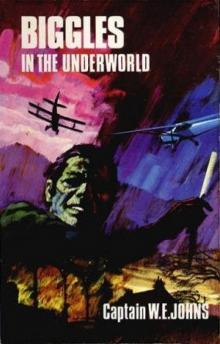 Biggles in the Underworld
Biggles in the Underworld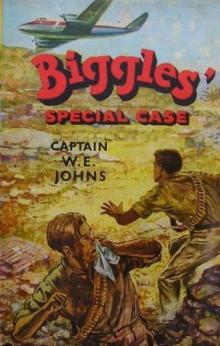 Biggles' Special Case
Biggles' Special Case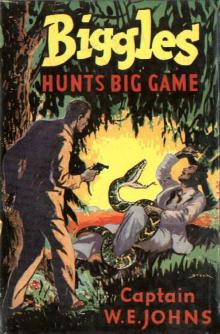 34 Biggles Hunts Big Game
34 Biggles Hunts Big Game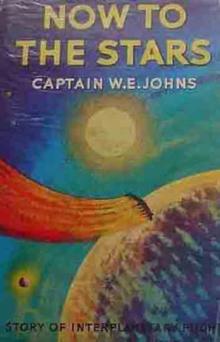 03 Now To The Stars
03 Now To The Stars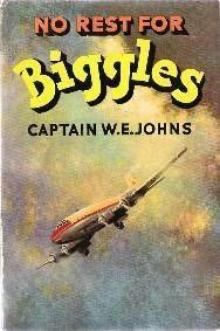 55 No Rest For Biggles
55 No Rest For Biggles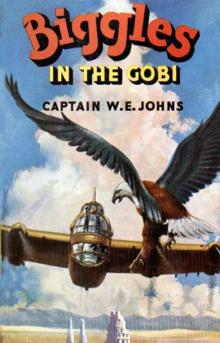 46 Biggles in the Gobi
46 Biggles in the Gobi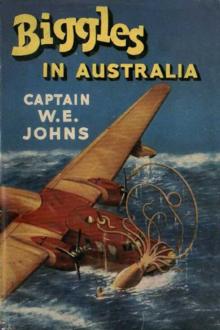 52 Biggles In Australia
52 Biggles In Australia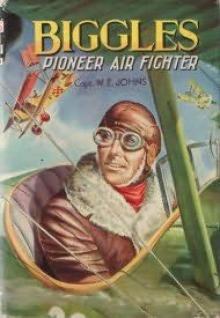 51 Biggles Pioneer Air Fighter
51 Biggles Pioneer Air Fighter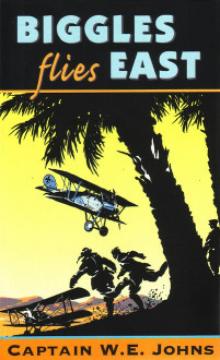 05 Biggles Flies East
05 Biggles Flies East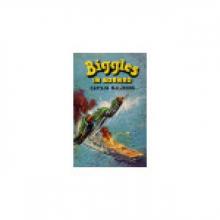 28 Biggles In Borneo
28 Biggles In Borneo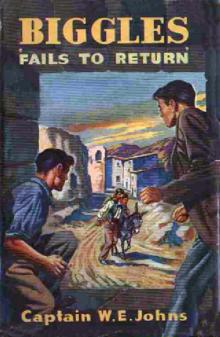 29 Biggles Fails to Return
29 Biggles Fails to Return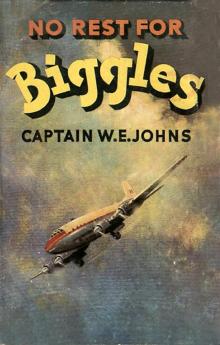 55 No Rest For Biggles (v2)
55 No Rest For Biggles (v2) Biggles Does Some Homework
Biggles Does Some Homework Biggles of the Camel Squadron
Biggles of the Camel Squadron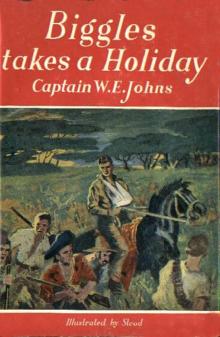 35 Biggles Takes A Holiday
35 Biggles Takes A Holiday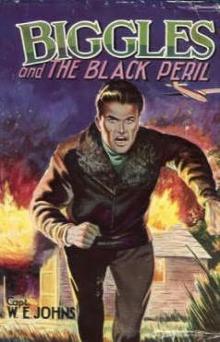 Biggles And The Black Peril (06)
Biggles And The Black Peril (06)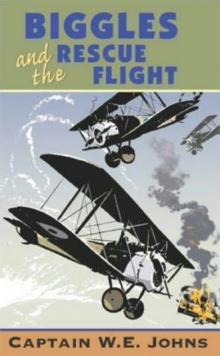 17 Biggles And The Rescue Flight
17 Biggles And The Rescue Flight Biggles Learns To Fly
Biggles Learns To Fly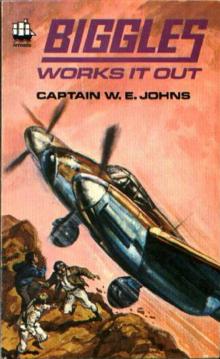 40 Biggles Works It Out
40 Biggles Works It Out 05 Biggles Learns To Fly
05 Biggles Learns To Fly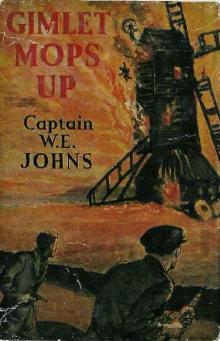 04 Gimlet Mops Up
04 Gimlet Mops Up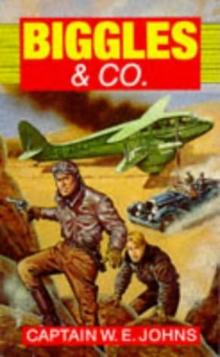 10 Biggles and Co
10 Biggles and Co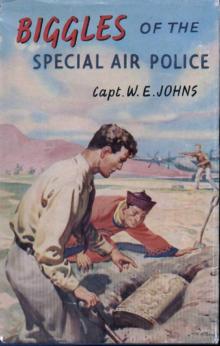 47 Biggles Of The Special Air Police
47 Biggles Of The Special Air Police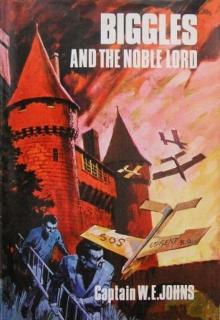 Biggles and the Noble Lord
Biggles and the Noble Lord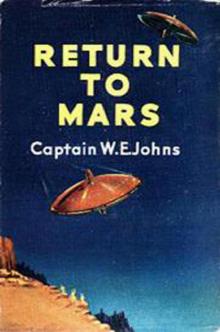 T2 Return To Mars
T2 Return To Mars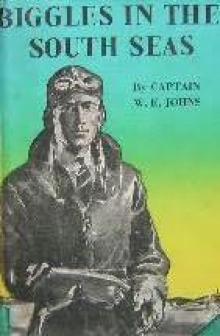 21 Biggles In the South Seas
21 Biggles In the South Seas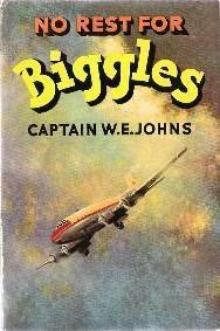 No Rest For Biggles
No Rest For Biggles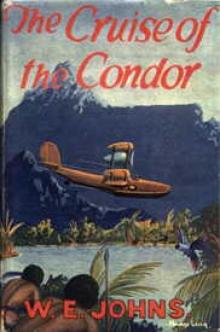 Biggles In The Cruise Of The Condor (02)
Biggles In The Cruise Of The Condor (02)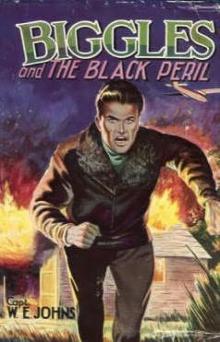 06 Biggles And The Black Peril
06 Biggles And The Black Peril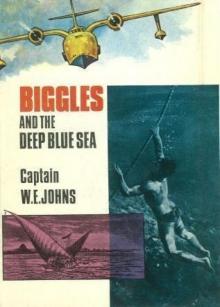 Biggles and the Deep Blue Sea
Biggles and the Deep Blue Sea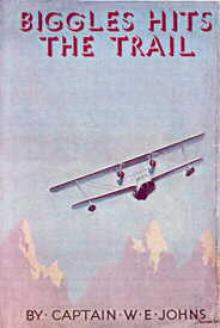 06 Biggles Hits The Trail
06 Biggles Hits The Trail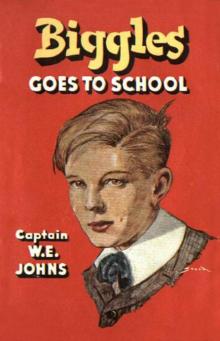 39 Biggles Goes To School
39 Biggles Goes To School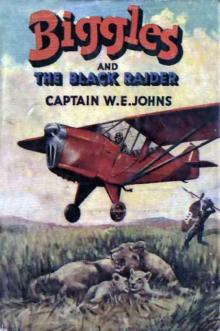 44 Biggles and the Black Raider
44 Biggles and the Black Raider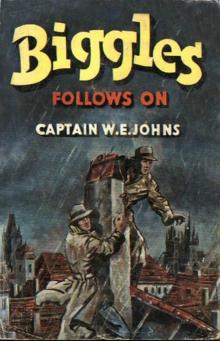 42 Biggles Follows On
42 Biggles Follows On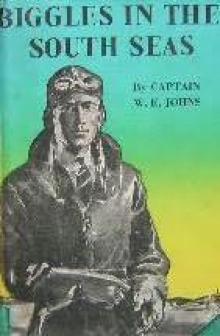 Biggles In the South Seas
Biggles In the South Seas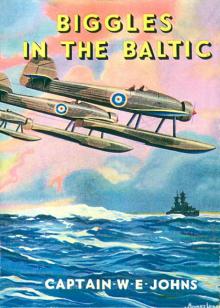 21 Biggles In The Baltic v3
21 Biggles In The Baltic v3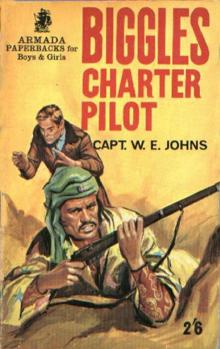 27 Biggles - Charter Pilot
27 Biggles - Charter Pilot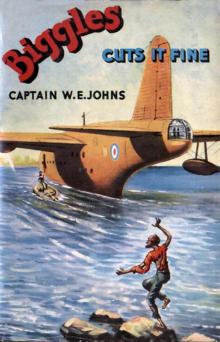 49 Biggles Cuts It Fine
49 Biggles Cuts It Fine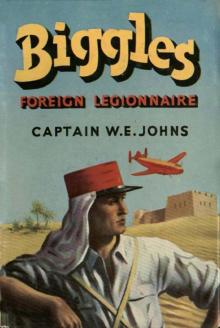 51 Biggles Foreign Legionaire
51 Biggles Foreign Legionaire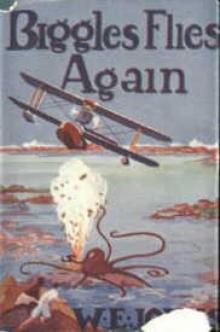 04 Biggles Flies Again
04 Biggles Flies Again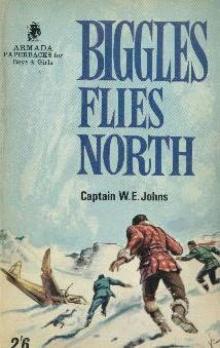 16 Biggles Flies North
16 Biggles Flies North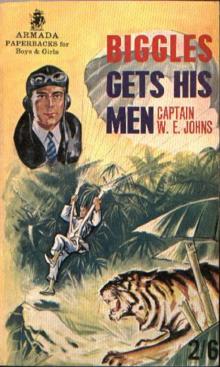 37 Biggles Gets His Men
37 Biggles Gets His Men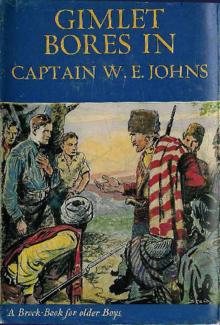 07 Gimlet Bores In
07 Gimlet Bores In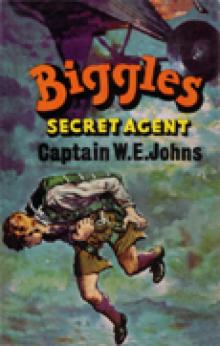 19 Biggles Secret Agent
19 Biggles Secret Agent 32 Biggles In The Orient
32 Biggles In The Orient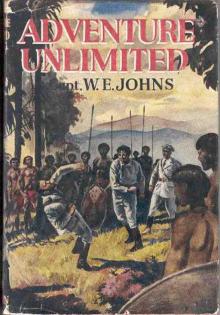 Adventure Unlimited
Adventure Unlimited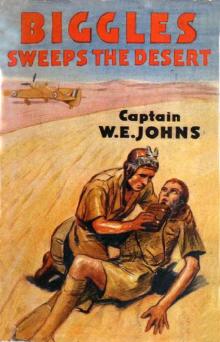 26 Biggles Sweeps The Desert
26 Biggles Sweeps The Desert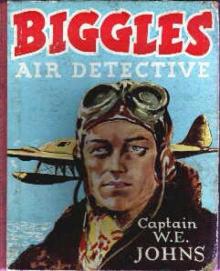 Biggles Air Detective (43)
Biggles Air Detective (43) 36 Biggles Breaks The Silence
36 Biggles Breaks The Silence 14 Biggles Goes To War
14 Biggles Goes To War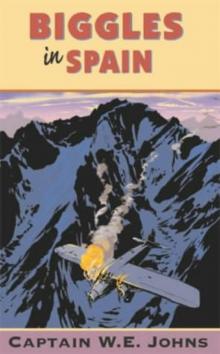 18 Biggles In Spain
18 Biggles In Spain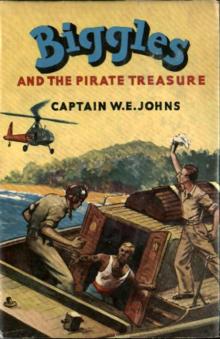 50 Biggles and the Pirate Treasure
50 Biggles and the Pirate Treasure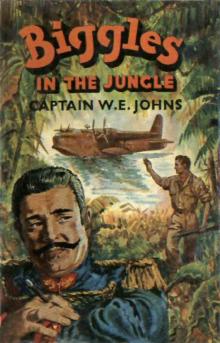 25 Biggles In The Jungle
25 Biggles In The Jungle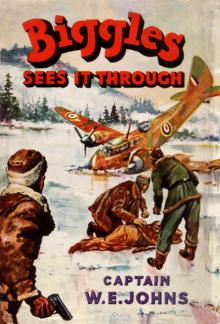 23 Biggles Sees It Through
23 Biggles Sees It Through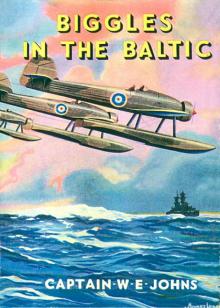 21 Biggles In The Baltic
21 Biggles In The Baltic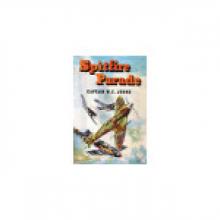 24 Spitfire Parade
24 Spitfire Parade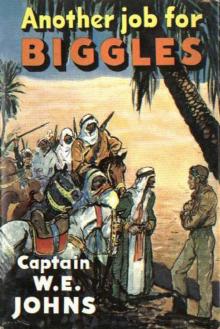 38 Another Job For Biggles
38 Another Job For Biggles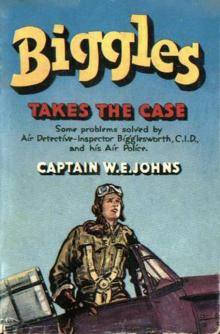 41 Biggles Takes The Case
41 Biggles Takes The Case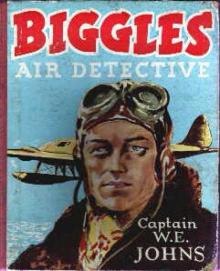 43 Biggles Air Detective
43 Biggles Air Detective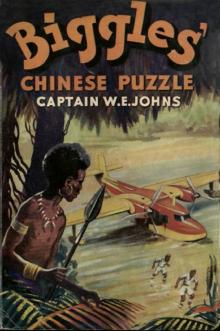 53 Biggles Chinese Puzzle
53 Biggles Chinese Puzzle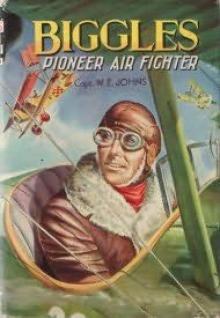 Biggles Pioneer Air Fighter (51)
Biggles Pioneer Air Fighter (51)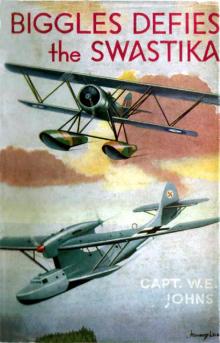 22 Biggles Defies The Swastika
22 Biggles Defies The Swastika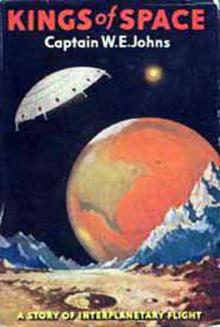 01 Kings Of Space
01 Kings Of Space